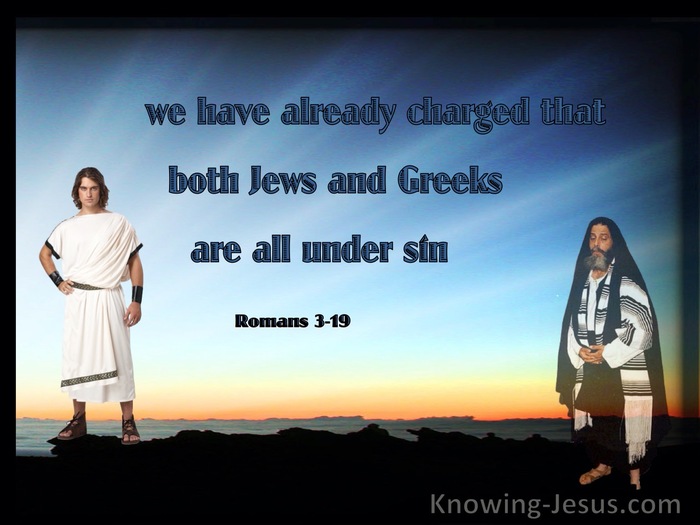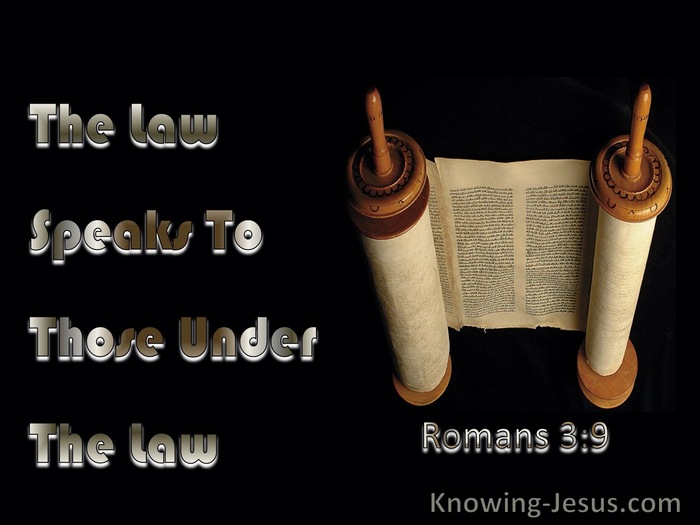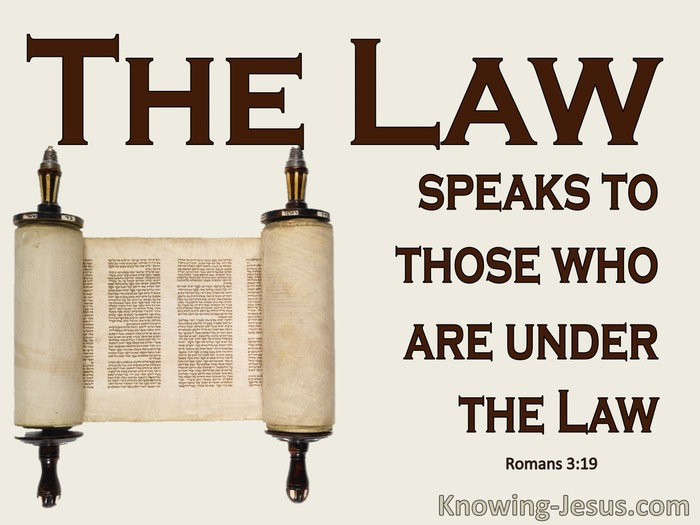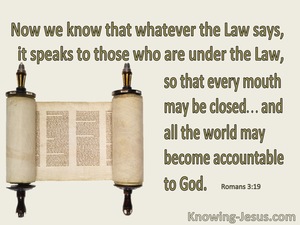Parallel Verses
Weymouth New Testament
But it cannot be denied that all that the Law says is addressed to those who are living under the Law, in order that every mouth may be stopped, and that the whole world may await sentence from God.
New American Standard Bible
Now we know that whatever the
King James Version
Now we know that what things soever the law saith, it saith to them who are under the law: that every mouth may be stopped, and all the world may become guilty before God.
Holman Bible
Now we know that whatever the law says
International Standard Version
Now we know that whatever the Law says applies to those who are under the Law, so that every mouth may be silenced and the whole world held accountable to God.
A Conservative Version
Now we know that as many things as the law says, it says to those in the law, so that every mouth may be stopped, and all the world may become accountable to God.
American Standard Version
Now we know that what things soever the law saith, it speaketh to them that are under the law; that every mouth may be stopped, and all the world may be brought under the judgment of God:
Amplified
Now we know that whatever the Law [of Moses] says, it speaks to those who are under the Law, so that [the excuses of] every mouth may be silenced [from protesting] and that all the world may be held accountable to God [and subject to His judgment].
An Understandable Version
Now we [all] know that everything the law says applies to those who are under [obligation to obey] that law, [Note: Here "the law" appears to refer to the Old Testament Scriptures generally, since Psalms and Isaiah are quoted. See verses 10-18]. This is so that the mouth of every objector may be stopped [i.e., from making excuses for his sin], and thereby bring the entire world under God's judgment [i.e., both Jews and Gentiles].
Anderson New Testament
Now we know that what the law says, it speaks- to those who are under the law, that every mouth may be stopped, and all the world become guilty before God.
Bible in Basic English
Now, we have knowledge that what the law says is for those who are under the law, so that every mouth may be stopped, and all men may be judged by God:
Common New Testament
Now we know that whatever the law says, it says to those who are under the law, so that every mouth may be stopped and the whole world may be held accountable to God.
Daniel Mace New Testament
Now we know that whatever the law says, it says to those who are under the law: that every one may be silenc'd, and all the world plead guilty before God.
Darby Translation
Now we know that whatever the things the law says, it speaks to those under the law, that every mouth may be stopped, and all the world be under judgment to God.
Godbey New Testament
But we know that so many things as the law speaks, it says to those under the law: that every mouth may be stopped, and the whole world may become guilty before God.
Goodspeed New Testament
Now we know that everything the Law says is addressed to those under its authority, so that every mouth may be shut, and the whole world be made accountable to God.
John Wesley New Testament
Now we know that whatsoever the law saith, it saith to them that are under the law; that every mouth may be stopped, and all the world be found guilty before God.
Julia Smith Translation
And we know that whatever says the law, it speaks to them in the law: that every mouth be shut, and all the world be culpable to God.
King James 2000
Now we know that whatsoever things the law says, it says to them who are under the law: that every mouth may be stopped, and all the world may become guilty before God.
Lexham Expanded Bible
Now we know that whatever the law says, it speaks to those under the law, in order that every mouth may be closed and the whole world may become accountable to God.
Modern King James verseion
But we know that whatever things the Law says, it says to those who are under the Law; so that every mouth may be stopped and all the world may be under judgment before God,
Modern Spelling Tyndale-Coverdale
Yea and we know that whatsoever the law saith, he saith it to them which are under the law: That all mouths may be stopped, and all the world be subdued to God,
Moffatt New Testament
Whatever the Law says, we know, it says to those who are inside the Law, that every mouth may be shut and all the world made answerable to God;
Montgomery New Testament
Now we know that whatever the Law says, it speaks to those who are under the Law; so that every mouth may be shut, and all the world may be brought under the judgment of God.
NET Bible
Now we know that whatever the law says, it says to those who are under the law, so that every mouth may be silenced and the whole world may be held accountable to God.
New Heart English Bible
Now we know that whatever things the law says, it speaks to those who are under the law, that every mouth may be closed, and all the world may be brought under the judgment of God.
Noyes New Testament
Now we know that whatever the Law saith, it saith to those who are under the Law; that every mouth may be stopped, and all the world become subject to condemnation before God.
Sawyer New Testament
But we know that whatever the law says, it says to those having the law, that every mouth may be stopped and all the world become guilty before God.
The Emphasized Bible
Now we know that, whatsoever things the law saith, to them who are within the law, it speaketh, in order that, every mouth, may be stopped and all the world come, under penal sentence, unto God.
Thomas Haweis New Testament
Now we know that whatsoever things the law saith, it speaks to those who are under the law: that every mouth might be sealed up, and all the world become criminal before God.
Twentieth Century New Testament
Now we know that everything said in the Law is addressed to those who are under its authority, in order that every mouth may be closed, and the whole world become liable to the judgment of God.
Webster
Now we know that whatever things the law saith, it saith to them who are under the law: that every mouth may be stopped, and all the world may become guilty before God.
Williams New Testament
Now we know that everything the law says is spoken to those who are under its authority, that every mouth may be stopped and the whole world be held responsible to God.
World English Bible
Now we know that whatever things the law says, it speaks to those who are under the law, that every mouth may be closed, and all the world may be brought under the judgment of God.
Worrell New Testament
Now we know that whatsoever the law says, it speaks to those under the law; that every mouth may be stopped, and that the whole world may be under the sentence of God;
Worsley New Testament
it saith to those under the law: that every mouth may be stopped, and all the world obnoxious to the justice of God.
Youngs Literal Translation
And we have known that as many things as the law saith, to those in the law it doth speak, that every mouth may be stopped, and all the world may come under judgment to God;
Themes
Bigotry » Paul's argument against
Condemnation » The law testifies to the justice of
Judgment » None, by nature can stand in
Law » Bondage of » Insufficient
Interlinear
De
Hoti
ἵνα
Hina
Usage: 472
Hosos
Pas
Pas
References
Word Count of 37 Translations in Romans 3:19
Prayers for Romans 3:19
Verse Info
Context Readings
Appointing The Twelve Apostles
18 "There is no fear of God before their eyes." 19 But it cannot be denied that all that the Law says is addressed to those who are living under the Law, in order that every mouth may be stopped, and that the whole world may await sentence from God. 20 For on the ground of obedience to Law no man living will be declared righteous before Him. Law simply brings a sure knowledge of sin.
Cross References
Romans 3:9
What then? Are we Jews more highly estimated than they? Not in the least; for we have already charged all Jews and Gentiles alike with being in thraldom to sin.
John 15:25
But this has been so, in order that the saying may be fulfilled which stands written in their Law, 'They have hated me without any reason.'
Romans 1:20
For, from the very creation of the world, His invisible perfections--namely His eternal power and divine nature--have been rendered intelligible and clearly visible by His works, so that these men are without excuse.
Matthew 22:12-13
"'My friend,' he said, 'how is it that you came in here without a wedding robe?'
John 8:9
They listened to Him, and then, beginning with the eldest, took their departure, one by one, till all were gone. And Jesus was left behind alone--and the woman in the centre of the court.
John 10:34-35
"Does it not stand written in your Law," replied Jesus, "'I said, you are gods'?
Romans 2:1-2
You are therefore without excuse, O man, whoever you are who sit in judgement upon others. For when you pass judgement on your fellow man, you condemn yourself; for you who sit in judgement upon others are guilty of the same misdeeds;
Romans 2:12-18
For all who have sinned apart from the Law will also perish apart from the Law, and all who have sinned whilst living under the Law, will be judged by the Law.
Romans 3:2
The privilege is great from every point of view. First of all, because the Jews were entrusted with God's truth.
Romans 3:4
No, indeed; let us hold God to be true, though every man should prove to be false. As it stands written, "That Thou mayest be shown to be just in the sentence Thou pronouncest, and gain Thy cause when Thou contendest."
Romans 3:23
for all alike have sinned, and all consciously come short of the glory of God,
1 Corinthians 1:29
to prevent any mortal man from boasting in the presence of God.
1 Corinthians 9:20-21
To the Jews I have become like a Jew in order to win Jews; to men under the Law as if I were under the Law--although I am not--in order to win those who are under the Law;
Galatians 3:10
All who are depending upon their own obedience to the Law are under a curse, for it is written, "Cursed is every one who does not remain faithful to all the precepts of the Law, and practise them."
Galatians 3:22-23
But Scripture has shown that all mankind are the prisoners of sin, in order that the promised blessing, which depends on faith in Jesus Christ, may be given to those who believe.
Galatians 4:5
in order to purchase the freedom of all who were subject to Law, so that we might receive recognition as sons.
Galatians 4:21
Tell me--you who want to continue to be subject to Law--will you not listen to the Law?
Galatians 5:18
But if the Spirit is leading you, you are not subject to Law.







